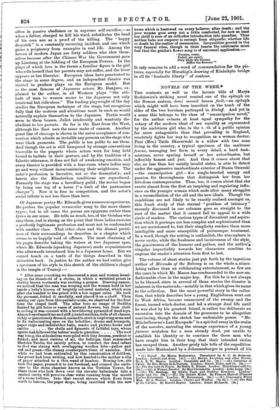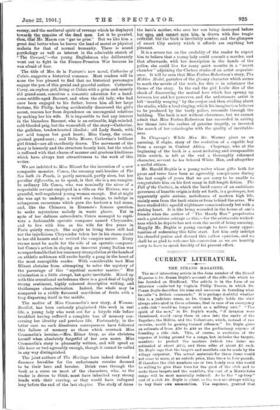NOVELS OF THE WEEK.*
THE contents as well as the laconic title of Marys Rodziewicz's striking novel remind one of the epitaph on the Roman matron, domi mans it lanam fecit,—an epitaph which might well have been inscribed on the tomb of the elder of the two heroines portrayed in Distaff. And yet in a sense this belongs to the class of "emancipation novel," for the author evinces at least equal sympathy for the votary of the modern ideal of sex equality as represented by the ambitious girl who, in the tk 3th of a public opinion far more antagonistic than that prevailing in England, resolutely fights her way to recognition as a woman doctor. Pani (Mrs.) Taida Skarsewski is a widow with two sons living in the country, a typical specimen of the maitresse femme, managing her farm in every detail, a hard task. mistress, never sparing herself or her subordinates, but inflexibly honest and just. And thus it comes about that she, no less than her saintly invalid sister, is able to detect under the aggressive insubordinate exterior of Stasia Ozierski —the emancipation girl—Cm single-hearted energy and passion for thoroughness that distinguish her from her frivolous contemporaries. Thus, too, it comes about that she exerts almost from the first an inspiring and regulating influ- ence on the younger woman which ends after many struggles in a reconciliation of the old and the new ideals. Though the conditions are not likely to be exactly realised amongst us, this frank study of that eternal "problem of intimacy" recently discussed in our columns goes so straight to the root of the matter that it cannot fail to appeal to a wide circle of readers. The various types of discontent and aspira- tion which it portrays are leas complex and sophisticated than we are accustomed to, but their simplicity renders them more intelligible and more susceptible of picturesque treatment. In a word, though the setting is outlandish, the atmosphere is never exotic, while the freshness and incisiveness of the style, the genuineness of the humour and pathos, and the author's singular impartiality towards her characters combine to : engross the reader's attention from first to last.
The volume of short stories just put forth by the ingenious author of Miranda of the Balcony is on the whole a stimu- lating rather than an exhilarating entertainment, so few are the cases in which Mr. Mason has condescended to the now un- fashionable close in the major key. For this he is not always to be blamed, since in several of these stories the disaster is inherent in the materials,—notably in that which gives its name to the collection. But the most powerful story in the collec- tion, that which describes how a young Englishman went out to West Africa, became enamoured of the swamp and the forest, turned witch-doctor, and led a strange dual life until he was shot by his greatest friend, is rather too deliberate an excursion into the domain of the gruesome to be altogether convincing, though the sketch has undeniable power. "Mr. Mitchelbourne's Last Escapade" is a spirited essay in the realm of the macabre, narrating the strange experience of a young farceur mistaken for a man already dead, yet unable to establish his identity or to convince the three men who have caught him in their trap that their intended victim has escaped them. Another grisly tale tells of the expedition made into Manicaland by a Johannesburger in pursuit of his S(1.)Distaff. By Marya Rodziewies. Translated by S. C. de Minions. London: Jarrold and Sons. [fis.j —(2.) Ensign Knithtigh and other Stories. By A. E. W. Mason. London : Constable and Co. 68.]—(3.) Catharine of Calais. By Mrs. Henry de Is Pasture. London : Smith, Elder, and Co. [63.J- (4) The Sea hath its Pearls. ByNallie K. Blisset. London: Hutchinson and Co. [68.]---(5.) A Woman-Derelict. By May Crommelin. London : John Long. [6s.] —(6.) The Heritage. By Edwin Pugh and Godfrey Burchett. London: Bands and Co. [64.]—(7.) The Hidden Model. By Frances Harrod (Frances Forbes-Robertson). London : W. Heinemann. [6s.J —(8.) Chapenga's White Man. By A. Werner. London: Chatto and Windus. [is. 6d.] —(9.) The Fall of the Curtain. By Harold Begbie. Landon: Grant Richards. [6..] enensyrand the medissval spirit'of revenge which' he displayed toward A thp remains of the dead man. Let it be granted, tlieni• tliat Mr. Mason can "gar us gine." But we like him a great deal better when he leaves the land of moral or physical malaria for that of normal humanity. There is sound psyrkolagy- as well as interest in the admirable sketch of "Tile Coward,"—the young Englishman who deliberately weld out to fight in the Franco-Prussian War because he was afraid of fear.
The -title of Mrs. de la Pasture's new novel, Catherine of Calais, suggests a historical romance. Most readers will be none the less pleased to find that no historical personages engage the pen of this genial and graceful author. Catherine Carey, an orphan girl, living at Calais with a grim and miserly old grand-aunt, conceives a romantic adoration for a hand- some middle-aged Baronet, and when the old lady, who had once been engaged to his father, leaves him all her large fortune, Sir Philip, having accidentally discovered the girl's secret, rescues her from dependence on uncongenial relatives by making her his wife. It is impossible to feel any interest in the blameless Baronet, who is an estimable, high-minded, cold-blooded prig, but the womenfolk of the story—Catherine, the guileless, tendes-hearted idealist; old Lady Sarah, with her acid tongue but good heart; Miss Carey, the cross. grained grand-aunt; and Delia Moore, Catherine's brilliant girl friend—are all excellently drawn. The movement of the story is leisurely and the structure loosely knit, but the whole is suffused with that charm of manner and gracious kindliness which have always lent attractiveness to the work of this writer.
We are indebted to Miss Blisset for the invention of a new composite monster. Conca, the uncanny anti-heroine of The Sea hails its Pearls, is partly mermaid, partly siren, but her peculiar differentia, so to speak, is that she is a sea-vampire- In ordinary life Conca, who was nominally the niece of a respectable servant employed in a villa on the Riviera, was a graceful, well-regulated young woman enough. But at night she was apt to undergo a weird sea change, to indulge in subaqueous excursions which gave the harbour a bad name, and, like the Chimera in Erasmus's famous question. to make mysterious melody in waste places. Yet in spite of her dubious antecedents, Conca managed to capti- vate a fashionable operatic composer named Chrysander, and to live with him as his wife for five years in Paris quietly enough. She might be living there still had not the injudicious Chrysander taken her in his steam-yacht to her old haunts and so revived the vampire nature. Every excuse must be made for the wife of an operatic composer, but Conca's action in slaying an innocent young Italian was so unpardonable that her summary strangulation at the hands of an athletic nobleman will excite hardly a pang in the heart of the most susceptible reader. With considerable tact Miss Blisset abstains from attempting to solve the mystery of the parentage of this "mystical monster marine." Her elimination is a little abrupt, but quite inevitable. Mixed up with this sensational melodrama there is a good deal of highly strung sentiment, highly coloured descriptive writing, and Ouidaesque characterisation. Indeed, the whole may be compared to a richly flavoured macedoine of fruits with a frog disporting itself in the middle.
The motive of Miss Crommelin's new story, A Woman- Derelict, has been curiously plagiarised this week in real life, a young lady who went out for a bicycle ride befoie breakfast having suffered a complete loss Of memory con- cerning her identity and previous life. Fortunately, in the latter case no such disastrous consequences have followed this failure of memory as those which overtook Miss Crommelin's heroine,—Mrs. Elinor Grey, as she christens herself when absolutely forgetful of her own name. Miss Crommelin's story is pleasantly written, and will speed an idle hour or two agreeably enough, though it cannot be called in any way -distinguished.
The joint authors of The Heritage have indeed devised a damnosa hereditas for the unfortunate cousins doomed to be their hero and heroine. . Drink runs through the book as a curse on most of the characters, who, so the reader is driven to think, must have inherited very strong heads_ with . their craving, or they would have collapsed long before the end of the last chapter. The study of Anne the hero's mother, who sees her son being destroyed before her ezeg,a4camkot 94.ava hiu4 i1 drawn with fine tragic restrahit, but the book is inevitably sombre, and the glimpses of smart City society which it affords are anything but pleasant.
It is a severe tax on the credulity of the reader to expect him to believe that a young lady could commit a murder, and that afterwards, with her description in the hands of the police, she could live for many quiet months in a "secret chamber" adjoining the Chelsea studio of an artist acquaint- ance. It will be seen that Miss Forbes-Robertson's story, The Hidden Model, partakes of the gloomy character which seems to mark the novels of the week, for this is in substance the theme of the story. In the end the girl Leslie dies of the shock of discovering the mutual love which has sprung up between her and her preserver, and the unfortunate artist is left "terribly weeping" by the corpse and then striding about the studio, while a loud ringing, which his imagination believes to be produced by the tardy police, resounds through the building. The book is not without cleverness, but we cannot admit that Miss Forbes-Robertson has succeeded in raising her theme into the realms of genuine tragedy, or invested the march of her catastrophe with the quality of inevitable- ness.
In Chapenga's White Man Mr. Werner gives us an amusing, if slight, story of the evolution of a capable boy from a savage in Central Africa. Chapenga, who at the beginning of the book is a most irritating and irresponsible little wretch, is left at the end a thoroughly reformed character, servant to his beloved White Man, and altogether a useful citizen.
Mr. Harold Begbie is a young writer whose gifts both for prose and verse have been so agreeably conspicuous during the last couple of years that we are sorry to be unable to congratulate him on his first essay in full-length fiction. The Fall of the Curtain, in which the lurid career of an ambitious governess of humble origin is duly set forth, is a grotesque, but apparently quite serious, melodrama of modern high life, mainly seen from the back-stairs or from behind the arras. We have studied this squalid nightmare conscientiously but with a sinking heart. It is like being wounded in the house of one's friends when the author of " The Handy Man" perpetrates such a gratuitous outrage as this,—for the aristocratic wicked- ness which he depicts has not even the merit of being amusing. Happily Mr. Begbie is young enough to have many oppor- tunities of redeeming this false start. Let him only indulge his cheerful genius and discard this callow cynicism, and we shall be as glad to welcome his conversion as we are heartily sorry to have to speak harshly of his present effort.











































 Previous page
Previous page